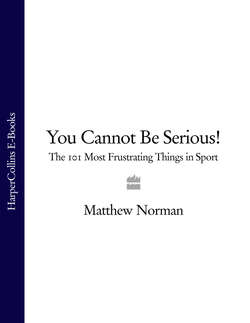Читать книгу You Cannot Be Serious!: The 101 Most Frustrating Things in Sport - Matthew Norman - Страница 8
Оглавление99
Adolf Hitler
On 28 May 1940, Winston Churchill held the most important Cabinet meeting in British history. With the Foreign Secretary Lord Halifax championing the majority view that the military situation was so hopeless that the only option was to sue for peace, the new Prime Minister had a desperate fight on his hands to keep buggering on against the Hun. The need to win round his ministers elicited from him what is regarded as even his greatest speech – the fight must continue even if it meant every one of them bleeding to death in the dust, he said, because a nation that is conquered can rise again, but one that surrenders is finished for ever. The memory always amuses when a peevish politician does what Hillary Clinton did in the spring of 2008, and insists that fancy oratory ain’t worth diddly.
For all that, I can’t help wondering if Winston could have spared himself the rhetorical bother had he known then what we know now about Hitler and cricket. In the event, all he would have needed to do was inform the Cabinet, take a vote and go back to his bath.
In fact this outrage didn’t emerge for another seven decades, when a contemporary account by a Hitler-loving Tory MP, one Oliver Locker-Lampson, was unearthed. This related how in 1923 Hitler came across some British expats enjoying a genteel game of cricket and asked if he could watch them play. Happy to oblige, these thoroughly decent coves went that extra mile for post-Versailles Treaty hatchet-burial by writing out the rules of the game for his perusal. Hitler, having duly perused, returned a few days later with his own team and took them on. The scorecard of this Anglo–German clash has never been published, but from what followed we may presume that the result pre-empted the one to follow in 1945.
In an unwonted flash of intolerance, Hitler took umbrage at the rules, declaring the game ‘insufficiently violent for German fascists’ (Bodyline, which might have changed his thinking there, had yet to come). To this end, and with a novel way of training troops in mind, he suggested tweaking the rules by introducing a larger, harder ball, and abandoning pads. The absence of any masterplan to jettison the protective box may well be further evidence of that rumoured gonadic deficit. With only one to protect, imaginary Nazi cricket scholars posit, why bother?
If the Führer had entirely misunderstood the point of the game, failing to appreciate the languor, subtlety, nuance and infinite complexities that make Test cricket the most captivating of sports, perhaps he can be forgiven. He was never a chap easily imagined daydreaming at deep fine leg, or taking four hours to score 23 on a flat wicket.
Even so, and however unsuccessfully, he had blazed the trail of cheap-thrills pseudo-cricket that would find its apotheosis in Twenty20, and for that, among other things, he cannot lightly be forgiven.
